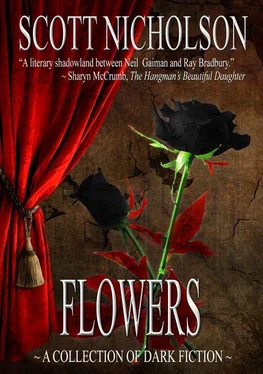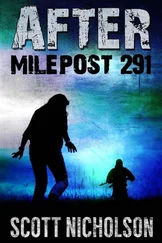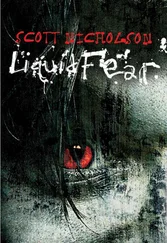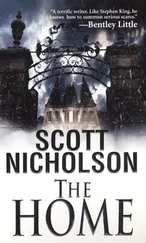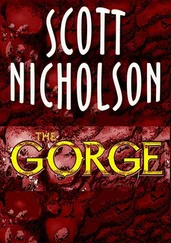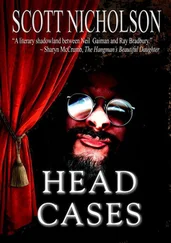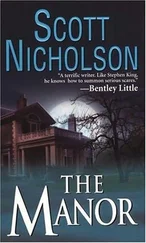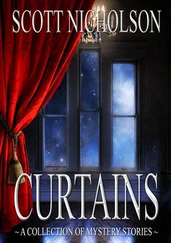Scott Nicholson - Ashes
Здесь есть возможность читать онлайн «Scott Nicholson - Ashes» весь текст электронной книги совершенно бесплатно (целиком полную версию без сокращений). В некоторых случаях можно слушать аудио, скачать через торрент в формате fb2 и присутствует краткое содержание. Жанр: Триллер, на английском языке. Описание произведения, (предисловие) а так же отзывы посетителей доступны на портале библиотеки ЛибКат.
- Название:Ashes
- Автор:
- Жанр:
- Год:неизвестен
- ISBN:нет данных
- Рейтинг книги:3 / 5. Голосов: 1
-
Избранное:Добавить в избранное
- Отзывы:
-
Ваша оценка:
- 60
- 1
- 2
- 3
- 4
- 5
Ashes: краткое содержание, описание и аннотация
Предлагаем к чтению аннотацию, описание, краткое содержание или предисловие (зависит от того, что написал сам автор книги «Ashes»). Если вы не нашли необходимую информацию о книге — напишите в комментариях, мы постараемся отыскать её.
Ashes — читать онлайн бесплатно полную книгу (весь текст) целиком
Ниже представлен текст книги, разбитый по страницам. Система сохранения места последней прочитанной страницы, позволяет с удобством читать онлайн бесплатно книгу «Ashes», без необходимости каждый раз заново искать на чём Вы остановились. Поставьте закладку, и сможете в любой момент перейти на страницу, на которой закончили чтение.
Интервал:
Закладка:
At the boy with the smile that curved like a blackberry thorn. At the boy who had stolen his face and meat and white bones. At the boy who was wearing his scuffed lace-up boots. At the boy who was looking down at his hands- no, MY hands, his cobwebbed mind screamed-as if the hands were a new pair of work gloves that needed to be broken in.
Then Jerp knew. He had forgotten to latch the gate behind him. Even though Grandpa had told him a thousand times. But Jerp had been so afraid. It wasn't his fault, was it?
Jerp tried to open his mouth, to scream, to tell the boy to get out of his skin, but Jerp's tongue was an old sock. He strained to flap the rags of his arms, but he felt himself falling into the loose hay. He choked on the cotton and chaff and sweetly sick odor of his own dry-rot. And still he saw, with eyes that were tickled by tobacco dust and stung by tears that would never fall.
Jerp watched as the boy now wearing Jerp's clothes bent to lift the pitchfork. The boy tried out its stolen skin, stretched its face into new smiles. Then the boy who had borrowed Jerp's body stepped between the haybales and was gone. Minutes or years later, the barn door slid open.
Jerp tried his limbs and found they worked, but they were much too light and boneless. He dragged himself to the window and pressed his sawdust head against the chickenwire. Jerp looked out over the moist fields that would now and always beckon him, he listened to the breezes that would laugh till the cows came home, he sniffed the meadows that would haunt his endless days. He wondered how long it would be before the next season of change. Already he ached from waiting.
Jerp looked down into the barnyard and saw the boy who wore his flesh walking toward the farmhouse, the pitchfork glinting under the moon, perhaps on his way to punish someone who had shirked the evening chores.
The boy remembered to latch the gate.
LAST WRITES
Ah, the vanity of the living.
Just look at him.
He sits on the upper floor and surveys the flat sweep of ocean. The sea is weak, exhausted from a night of stretching, yet he watches as if some catastrophe will occur at any moment. True, ships have sunk here in sight of shore on the calmest of summer days, but not on this man’s watch. All he knows is what the logbook has told him and what he has gleaned from the tales of those who sent him here.
He will not learn, and he has time ahead of him. His eyes may become bleary and strained, he will grow lonely, he will think things that no normal man should. Yet, when his term is over, he will rejoin the sweeping tide of the living and give this place little thought. He will leave this place, and that is why I hate him. That is why I must become a part of him, invade his thoughts and dreams. We each seek to become immortal, and I must live on through him.
He imagines himself a lighthouse keeper, yet he keeps nothing. He comes and he goes, like the others. And still I shall remain. I am the real keeper here.
He fancies he knows of solitude. Sitting there in his bamboo chair, with his lantern and bottle of spirits. The labels have changed over the years, grown more colorful, but the bottom of the bottle still speaks the same words. The speakers of several languages have sat in that chair: Portuguese, Italian, Dutch, but mostly English and Spanish. Yet the language is the same to me. Theirs is the language of the living.
This one is handsomer than some of the others. He has sideburns clipped close to the lobe, beard trimmed in a fashion I haven’t seen before. He is young. They get younger every year. Or perhaps I am older. Please, merciful God, let me be older.
The object on the table beside him emits a purring sound, like that of a cat stuck in a sewage drain. The man puts the object to his ear as if it were a conch and speaks.
“ Hello, Norfolk Lighthouse.”
He pauses, listening. If it were a conch instead of the strange object, he would be hearing the roar of the ocean. Or the blood rushing through his head. Sometimes those two things are the same.
“ Hi, Maleah,” he says, his face changing instantly, lifting into a bright and open expression.
Maleah. A pretty name. It sounds of Hawaii, that Pacific island region of which sailors sometimes speak. She must be as beautiful as her name.
I hate her, for she occupies him.
I go to the window, stick my head in a sea breeze ripe with the scream of gulls, but I can’t drown out his words.
“ I miss you, too,” he says. “But it’s only for a year. And I’ll get a lot of writing done while I’m here.”
His other hand, the one not holding the non-conch, goes to the bottle. He nods, sips, glances at the window. At me.
I rattle the shutters. Perhaps I am getting older. I don’t bang them with the same enthusiasm of a couple of centuries ago. Still, paint sloughs off and bits of stucco dust fall to the beach far below.
“ Maleah,” he says into the conch-thing. A telephone, they have called it. “Something weird is happening.”
Now I am “something weird.” I would sigh if I had breath. But I must do this the hard way. Just like always.
I knock on the door to the upper chamber. I stand on the winding staircase, the yawning gap of darkness that leads to a pale, gleaming light far below.
The door swings open, the strong stench of spirits marking his breath, and I see his stricken face-as stricken as mine, surely, and then I fall again, far, far, far. As I fall, I smile. He has forgotten Maleah and thinks of me.
Sooner or later, they all dream only of me. To the last.
I wasn’t always like this. When I was alive, I walked the beach in search of shark’s teeth and pretty shells. In bare feet, dawn fast and pink on the horizon, the water licking at my ankles with a gentle, foaming tongue. The lighthouse was a marker, a means to measure the distance I had walked from the cottage I shared with my doting, deaf parents.
Usually, I turned back when the lighthouse window was clearly visible, though on foggy mornings I might not see the towering structure until I was nearly upon it. On those days, a single bright lantern would burn in the uppermost window, serving as a guide for ships that might be daring the narrow passage. I was a ship myself, a vessel with an empty hull, as lost as any rudderless cutter.
On the day I died, I decided to keep walking, though the tide had run out and my parents would be waiting for me to sweep sand from the floors, cook mackerel, and air the mildewed blankets. I loathed the smell of fish. It permeated the walls, and driftwood smoke would leak through the fireplace stones and sting my eyes. That morning, I couldn’t bear the claustrophobic cottage. The day was warm and pleasant, with only a few thin strips of clouds in the blue sky. My feet carried me farther along the shore than I had been in years, to the north, toward the lighthouse that had been built before my birth. My passion for solitude could scarcely have been more gratified.
My father told me strange tales surrounding the lighthouse-how men who kept the light burning through the dark hours somehow lost some of their own light, so that when their year of duty was over, their eyes were dry and hollow, their faces lacking in emotion, their tongues slow to speak. Through the years, several ships had run aground in the shallows, while others had cracked their spines on the rocky outcroppings to the west. Perhaps the memories of those failures haunted the lighthouse keepers, though not every man had witnessed a tragedy. Perhaps it was merely the lengthy solitude that turned them into dull, haggard beasts.
The lighthouse towered before me that day, bright as sand as it stretched higher and higher into the sky with my every step. It was capped with copper that had long ago turned dull green. The masonry that from a distance had seemed solid revealed itself to be covered with spidery cracks, iron bands girding the base. As I grew nearer, I detected rust on the hardware of the single oaken door set in the rounded base of the structure.
Читать дальшеИнтервал:
Закладка:
Похожие книги на «Ashes»
Представляем Вашему вниманию похожие книги на «Ashes» списком для выбора. Мы отобрали схожую по названию и смыслу литературу в надежде предоставить читателям больше вариантов отыскать новые, интересные, ещё непрочитанные произведения.
Обсуждение, отзывы о книге «Ashes» и просто собственные мнения читателей. Оставьте ваши комментарии, напишите, что Вы думаете о произведении, его смысле или главных героях. Укажите что конкретно понравилось, а что нет, и почему Вы так считаете.
